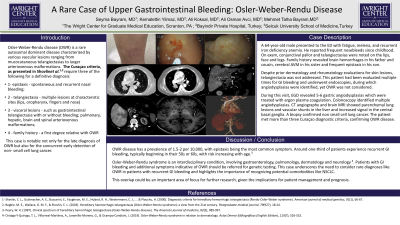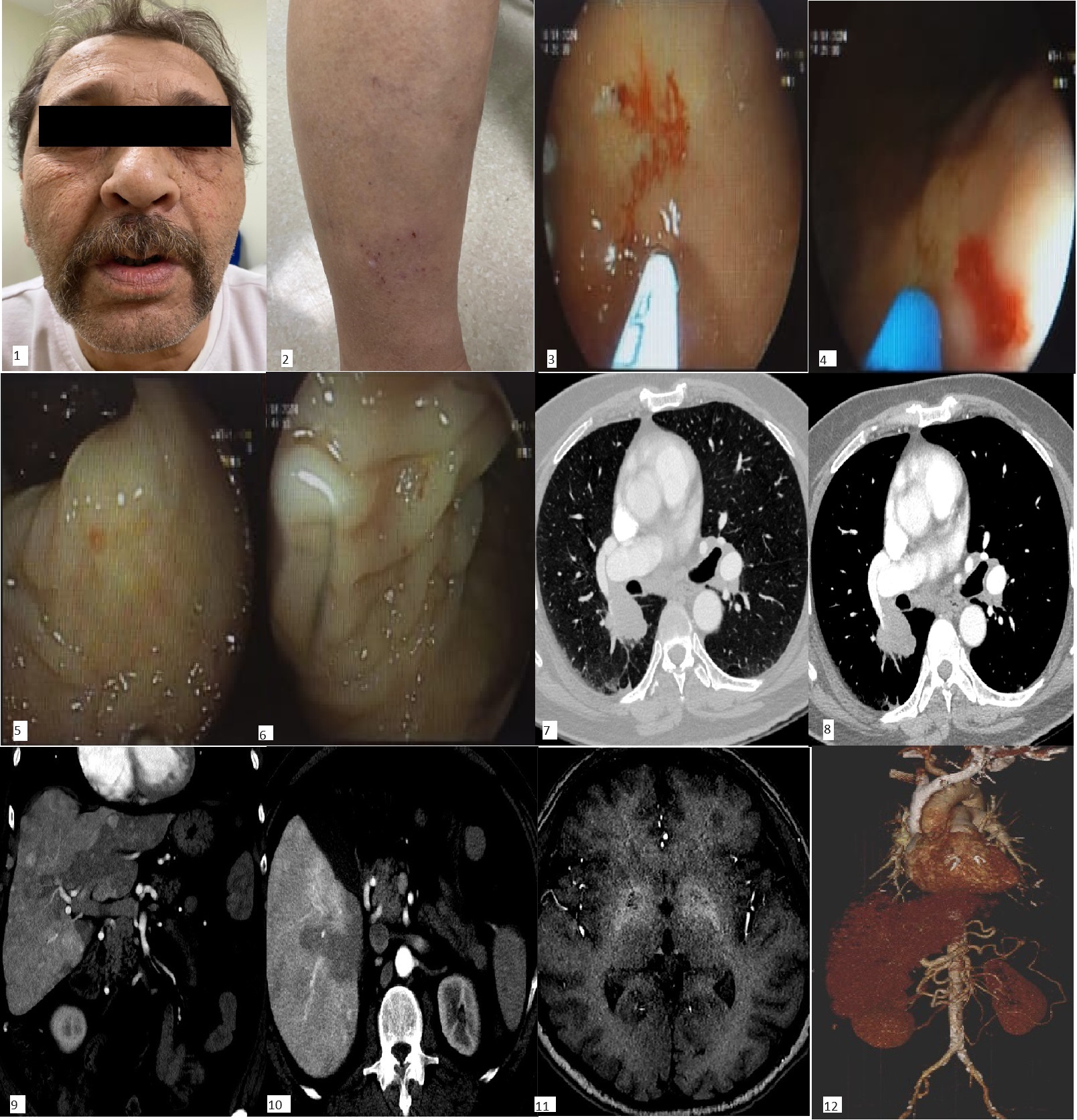Monday Poster Session
Category: GI Bleeding
P2522 - A Rare Case of Upper Gastrointestinal Bleeding: Osler-Weber-Rendu Disease
Monday, October 28, 2024
10:30 AM - 4:00 PM ET
Location: Exhibit Hall E

Has Audio
.jpg)
Seyma Bayram, MD
The Wright Center for Graduate Medical Education
Scranton, PA
Presenting Author(s)
Kemalettin Yilmaz, MD1, Ali Koksal, MD1, Seyma Bayram, MD2, Ali Osman Avci, MD3, Mehmet Talha Bayram, MD4
1Bayindir Private Hospital, Ankara, Ankara, Turkey; 2The Wright Center for Graduate Medical Education, Scranton, PA; 3Lokman Hekim University Ankara Hospital, Ankara, Ankara, Turkey; 4Konya Selcuk University, Konya, Konya, Turkey
Introduction: Non-variceal upper gastrointestinal (GI) bleeding is a significant clinical issue associated with considerable morbidity and mortality. Early diagnosis and intervention are crucial, particularly for rare conditions such as Osler–Weber–Rendu (OWR) disease, also known as hereditary hemorrhagic telangiectasia. This case is notable not only for the late diagnosis of OWR but also for the concurrent early detection of small cell lung cancer.
Case Description/Methods: A 64-year-old male presented to the emergency department with fatigue, melena, and recurrent iron deficiency anemia. He reported frequent nosebleeds since childhood. Physical examination revealed conjunctival pallor and telangiectasias on the lips, face and legs. The family history was significant for his father died from brain hemorrhages at the age of 54, his sister had surgery for a cerebral arteriovenous malformation (AVM), his cousin had a brain hemorrhage, and his son experienced frequent epistaxis.
Despite previous consultations with dermatology and rheumatology for nonspecific skin lesions, the diagnosis of telangiectasia was not addressed. This patient had been evaluated multiple times for GI bleeding and underwent endoscopies, during which angiodysplasias were identified, yet OWR was not considered.
During this visit, esophagogastroduodenoscopy (EGD) revealed 5-6 angiodysplasias in the stomach, which were treated with argon plasma coagulation. Colonoscopy identified multiple angiodysplasias in the colon. CT angiography and brain MRI detected parenchymal lung lesions and vascular shunts in the liver and increased signal in the central basal ganglia. A biopsy confirmed small cell lung cancer. The patient met more than three Curaçao diagnostic criteria, confirming OWR disease.
Discussion: OWR disease is characterized by mucocutaneous telangiectasia, AVMs, epistaxis, GI bleeding, and iron deficiency anemia. The prevalence is approximately 1.5-2 per 10,000 individuals. GI bleeding can be life-threatening. This case underscores the importance of considering rare diagnoses like OWR in patients with recurrent GI bleeding. Additionally, it highlights the need for vigilance in identifying potential comorbidities, such as SCLC. Comprehensive diagnostic workups, including family history and advanced imaging, are vital for timely and accurate diagnosis, ultimately improving patient outcomes. This overlap could be an important area of focus for further research, given the implications for patient management and prognosis.

Disclosures:
Kemalettin Yilmaz, MD1, Ali Koksal, MD1, Seyma Bayram, MD2, Ali Osman Avci, MD3, Mehmet Talha Bayram, MD4. P2522 - A Rare Case of Upper Gastrointestinal Bleeding: Osler-Weber-Rendu Disease, ACG 2024 Annual Scientific Meeting Abstracts. Philadelphia, PA: American College of Gastroenterology.
1Bayindir Private Hospital, Ankara, Ankara, Turkey; 2The Wright Center for Graduate Medical Education, Scranton, PA; 3Lokman Hekim University Ankara Hospital, Ankara, Ankara, Turkey; 4Konya Selcuk University, Konya, Konya, Turkey
Introduction: Non-variceal upper gastrointestinal (GI) bleeding is a significant clinical issue associated with considerable morbidity and mortality. Early diagnosis and intervention are crucial, particularly for rare conditions such as Osler–Weber–Rendu (OWR) disease, also known as hereditary hemorrhagic telangiectasia. This case is notable not only for the late diagnosis of OWR but also for the concurrent early detection of small cell lung cancer.
Case Description/Methods: A 64-year-old male presented to the emergency department with fatigue, melena, and recurrent iron deficiency anemia. He reported frequent nosebleeds since childhood. Physical examination revealed conjunctival pallor and telangiectasias on the lips, face and legs. The family history was significant for his father died from brain hemorrhages at the age of 54, his sister had surgery for a cerebral arteriovenous malformation (AVM), his cousin had a brain hemorrhage, and his son experienced frequent epistaxis.
Despite previous consultations with dermatology and rheumatology for nonspecific skin lesions, the diagnosis of telangiectasia was not addressed. This patient had been evaluated multiple times for GI bleeding and underwent endoscopies, during which angiodysplasias were identified, yet OWR was not considered.
During this visit, esophagogastroduodenoscopy (EGD) revealed 5-6 angiodysplasias in the stomach, which were treated with argon plasma coagulation. Colonoscopy identified multiple angiodysplasias in the colon. CT angiography and brain MRI detected parenchymal lung lesions and vascular shunts in the liver and increased signal in the central basal ganglia. A biopsy confirmed small cell lung cancer. The patient met more than three Curaçao diagnostic criteria, confirming OWR disease.
Discussion: OWR disease is characterized by mucocutaneous telangiectasia, AVMs, epistaxis, GI bleeding, and iron deficiency anemia. The prevalence is approximately 1.5-2 per 10,000 individuals. GI bleeding can be life-threatening. This case underscores the importance of considering rare diagnoses like OWR in patients with recurrent GI bleeding. Additionally, it highlights the need for vigilance in identifying potential comorbidities, such as SCLC. Comprehensive diagnostic workups, including family history and advanced imaging, are vital for timely and accurate diagnosis, ultimately improving patient outcomes. This overlap could be an important area of focus for further research, given the implications for patient management and prognosis.

Figure: 1. Mucocutaneous telangiectasia on face and lip.
2. Telangiectasia on the leg.
3. Angiodysplasia of the stomach, treated with argon plasma coagulation.
4. Angiodysplasia of the stomach, treated with argon plasma coagulation.
5. Angiodysplasia of the sigmoid colon.
6. Angiodysplasia of the sigmoid colon.
7. CT angiogram, parenchymal window: pulmonary arteriovenous malformation (AVM) and parenchymal lesion.
8. CT angiogram, mediastinal window: pulmonary arteriovenous malformation (AVM) and parenchymal lesion.
9. CT angiogram: liver arteriovenous malformation (AVM).
10. CT angiogram: liver arteriovenous malformation (AVM).
11. Brain MRI: increased signal intensity in the basal ganglia.
12. 3D CTA (computed tomography angiography) of intra-abdominal arteriovenous malformation (AVM).
2. Telangiectasia on the leg.
3. Angiodysplasia of the stomach, treated with argon plasma coagulation.
4. Angiodysplasia of the stomach, treated with argon plasma coagulation.
5. Angiodysplasia of the sigmoid colon.
6. Angiodysplasia of the sigmoid colon.
7. CT angiogram, parenchymal window: pulmonary arteriovenous malformation (AVM) and parenchymal lesion.
8. CT angiogram, mediastinal window: pulmonary arteriovenous malformation (AVM) and parenchymal lesion.
9. CT angiogram: liver arteriovenous malformation (AVM).
10. CT angiogram: liver arteriovenous malformation (AVM).
11. Brain MRI: increased signal intensity in the basal ganglia.
12. 3D CTA (computed tomography angiography) of intra-abdominal arteriovenous malformation (AVM).
Disclosures:
Kemalettin Yilmaz indicated no relevant financial relationships.
Ali Koksal indicated no relevant financial relationships.
Seyma Bayram indicated no relevant financial relationships.
Ali Osman Avci indicated no relevant financial relationships.
Mehmet Talha Bayram indicated no relevant financial relationships.
Kemalettin Yilmaz, MD1, Ali Koksal, MD1, Seyma Bayram, MD2, Ali Osman Avci, MD3, Mehmet Talha Bayram, MD4. P2522 - A Rare Case of Upper Gastrointestinal Bleeding: Osler-Weber-Rendu Disease, ACG 2024 Annual Scientific Meeting Abstracts. Philadelphia, PA: American College of Gastroenterology.
